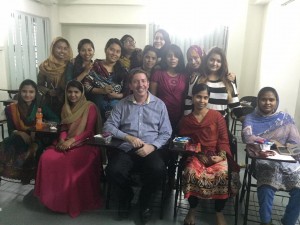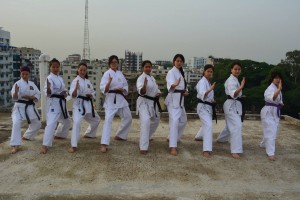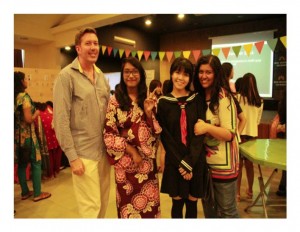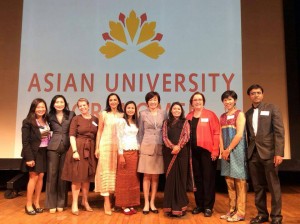Posted by Sydney Sparrow. Click here to join the JETwit Jobs Google Group and receive job listings even sooner by email.
Position: KCJS Postdoctoral Fellow
Posted by: Kyoto Consortium for Japanese Studies
Location: Kyoto, Japan
Contract: Full-Time
Thank you to our friends at the American Association of Teachers of Japanese for this Job Posting.
About the Program: The Kyoto Consortium for Japanese Studies is searching for a KCJS Postdoctoral Fellow for the academic year 2024-25, with the possibility of extension. Based at Doshisha University in Kyoto, Japan, KCJS is an undergraduate study abroad program governed by a consortium of thirteen American universities and administered by the Center for Undergraduate Global Engagement at Columbia University.
About the Position: The KCJS Fellow is expected to engage in their own research and teach one course each semester in Kyoto. One course should be in the fellow’s own field of interest, while the second should be a broad introductory survey of Japanese civilization. Such a survey may be provided with a particular disciplinary emphasis, such as art, religion, literature or cultural studies. Both courses should be designed to appeal to a wide range of majors and take full advantage of KCJS’s location, preferably encompassing local excursions, hands-on demonstrations, and/or observations.
Read MoreJillian Marshall to speak on “Reimagining Memoir” at the Japan Writers Conference
Posted by Tom Baker
JET alum Jillian Marshall, author of “Japanthem,” will delve into the nature of memoir in a presentation at the Japan Writers Conference.
Here’s the official description of her presentation:
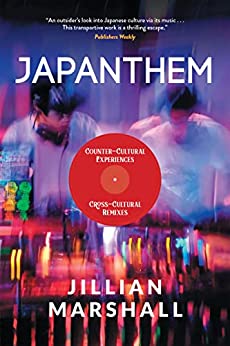
Jillian Marshall
Reimagining Memoir: Storytelling as Analytical Inquiry
Short Lecture with Q&A online
Nonfiction
What lies between the traditional boundaries of non-fiction genres? This presentation examines the analytical possibilities of memoir and storytelling. Bookended by presentation and discussion, we will read a chapter from my new book as a case-study in analytical memoir, learning about Japanese music culture in the process.
This hybrid presentation and group reading introduces new approaches to memoir devised during my time in (and departure from) academia. Following with a brief lecture questioning the limits of non-fiction genre — what does the slippage between memoir and ethnography reveal? — we’ll examine analytical memoir by reading a chapter of my new book, Japanthem: Counter-Cultural Experiences, Cross-Cultural Remixes. Originally written as part of my doctoral thesis in Japanese ethnomusicology, the selected chapter and Japanthem on whole posit memoir and storytelling as colloquial sites of anthropological inquiry (in this case, getting subtly bullied by my Buddhist dance teacher in Akita Prefecture). With the Q and A that follows, I ultimately hope to inspire new possibilities in non-fiction writing and bridge not just the intellectual rigor of academia with the public sphere, but cultural (mis)understandings between Japan, the US, and beyond in the process.
Jillian Marshall, PhD, is a writer, educator, and musician who champions public intellectualism. Her first book, Japanthem: Counter-Cultural Experiences, Cross-Cultural Remixes, debuted in April with Three Rooms Press. Jillian’s other writings have been published by the Sasakawa Peace Foundation, Cornell University Press, and Music Television.
Todd Jay Leonard to speak on textbook publishing at the Japan Writers Conference
Posted by Tom Baker
Textbook author Todd Jay is one of the JET alumni writers who will be giving presentations at the 2022 Japan Writers Conference, held on Oct. 15-16 at the Shonan Campus of Tokai University in Hiratsuka, Kanagawa Prefecture. For details, see http://japanwritersconference.org. Here’s the official description of his presentation:
Todd Jay Leonard
Publishing in the EFL Market in Japan: Four Perspectives on How to Make Your Proposal Count
Short Lecture with Q&A
Instructional
This presentation will outline the current publishing market in Japan for EFL/ESL textbooks by reviewing the various points of view of the publishing industry. The presenter, Todd Jay Leonard, has published extensively within the ESL/EFL market in Japan and will offer helpful advice to budding authors who wish to pursue projects geared to Japan’s domestic market.
Most likely, every language teacher in Japan has (at some point during his/her tenure) contemplated writing a textbook to fill a void in the market…in that constant search for the perfect, all-encompassing textbook.
In today’s competitive publishing world, getting the proverbial “foot in the door” can seem daunting and nearly impossible. What are publishers looking for in the current market? What appeals to editors who ultimately decide which titles go to production and which ones do not? What are the salespeople on the front lines hearing from their market base? What must an author do in order to get his/her book published?
This presentation focuses on these very questions, offering inside insights from all the various points of view that must be considered when writing a proposal to publish a textbook–the publisher, the editor, the salesperson, and the author. Professor Leonard explains the realities within the publishing industry and addresses some common myths associated with EFL publishing.
Todd Jay Leonard has been actively involved in book publishing for 30 years and has published 26 books. He has published books with a number of different Japanese publishing companies and this experience has given him a unique perspective in offering advice to potential authors on what the market is looking for currently and what the publishing industry is searching for in new titles.
He lives, writes, and teaches on the southern island of Kyushu, where he is a university professor at University of Teacher Education Fukuoka and is the department head for the English Department for the graduate faculty. He has published extensively in academic journals, magazines, and newspapers on cross-cultural, historical, and Teaching English as a Foreign Language (TEFL) themes.
JETAA-sphere Ep 15: Takaaki Hiratsuka on his new book about ALTs in the JET Program
**In Episode 15 of the JETAA-sphere podcast, we interview Professor Takaaki Hiratsuka, author of the new book Narrative inquiry into language teacher identity: ALTs in the JET program.
Click this link http://bit.ly/VBL-Register to register for the May 28 book launch event!
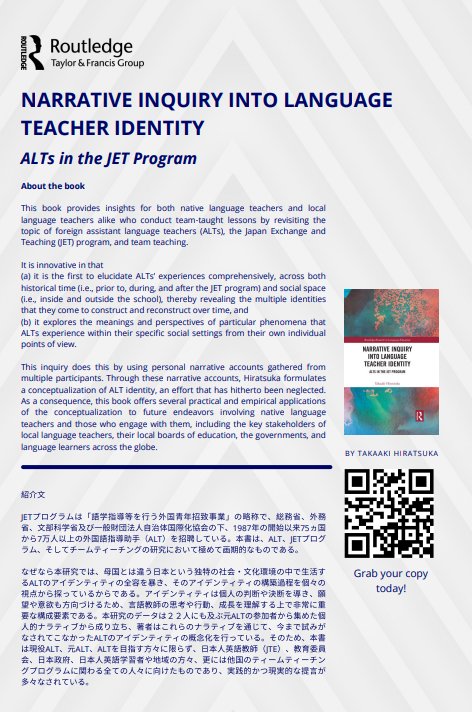
**Co-hosts: Steven Horowitz (Aichi, 1992-94) & Mark Frey (Kumamoto, 2002-2006)
**About Prof. Takaaki Hiratsuka:
List of Prof. Hiratsuka’s writings and presentations
Bio: Takaaki Hiratsuka is an associate professor in the Department of Global Studies at Ryukoku University, in Kyoto where he teaches a range of applied linguistics courses and supervises master’s and PhD students in related fields of language teacher education and narrative inquiry. He has a PhD in Language Teaching and Learning from the University of Auckland, New Zealand. And an avid futsal player.
**Other JET Alumni or Friends of JET mentioned in this episode:
- Bruce Feiler (Tochigi-ken, 1988-89), author of numerous best-sellers including Learning to Bow
- David L. McConnell, author of Importing Diversity: Inside Japan’s JET Program
- Earth Bennett (Aomori-ken, 2000-03), author of the JET cartoon strip series Every Situation Is Different
- David Namisato (Aomori-ken-2002-04), author of the cartoon book Life After the B.O.E.
- Khalid Birdsong (Osaka-fu, Shimamoto-cho, 2003-05), author of the cartoon series Fried Chicken & Sushi
****************************
Special thanks to USJETAA and CLAIR for their support for the JETAA-sphere!
The JETAA-sphere Podcast: Ep 5 – Adam Lisbon, JETAA Rocky Mountain
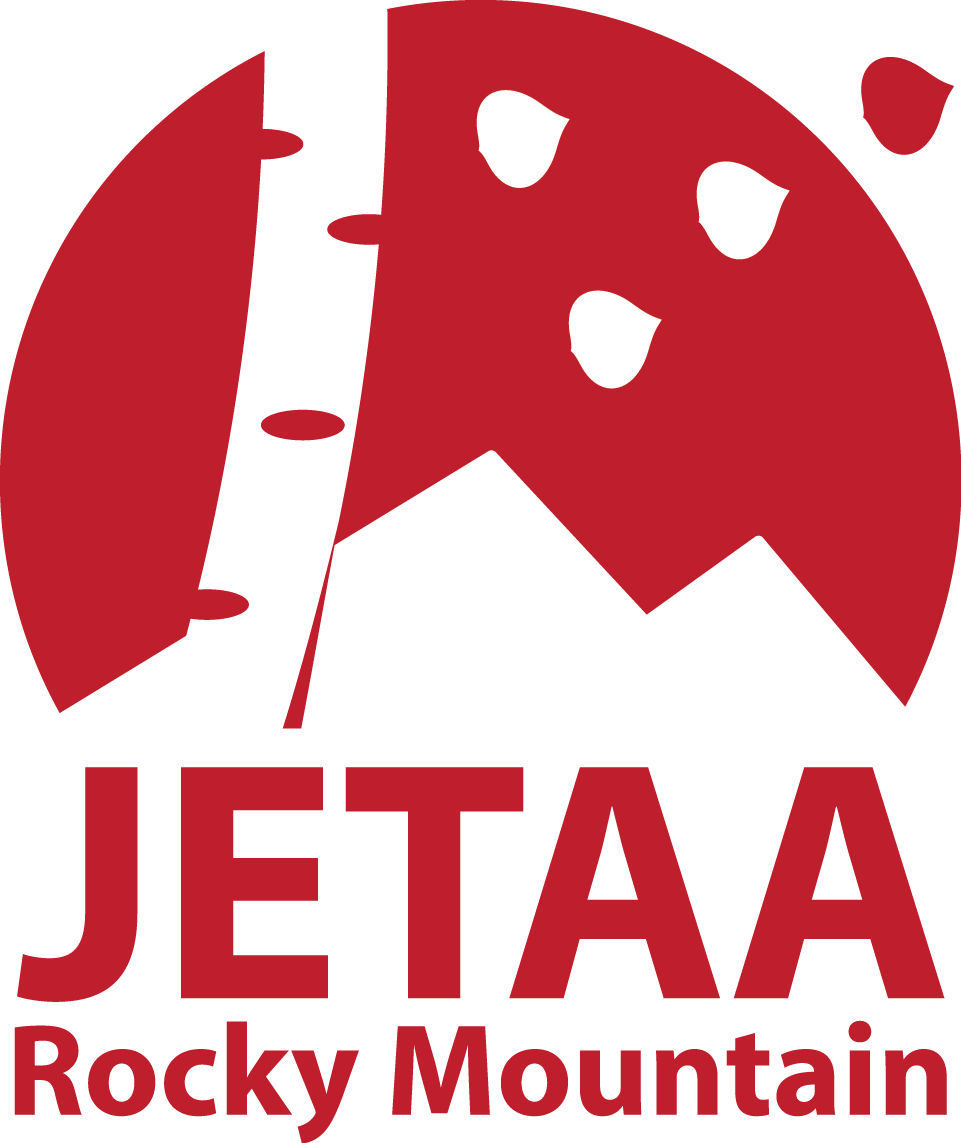
******************
From JETwit Media, it’s the 5th episode of the JETAA-sphere Podcast!
Former JETAA Rocky Mountain chapter president Adam Lisbon (Kobe-shi, 2004-07) joins Zach Piper (Kochi-ken, 2001-04) and Steven Horowitz(Aichi-ken, 1992-94) to talk about JETAA Rocky Mountain, his work as Japanese & Korean Studies Librarian at the University of Colorado Boulder, Colorado’s Japanese-American history, and JET days of yore.
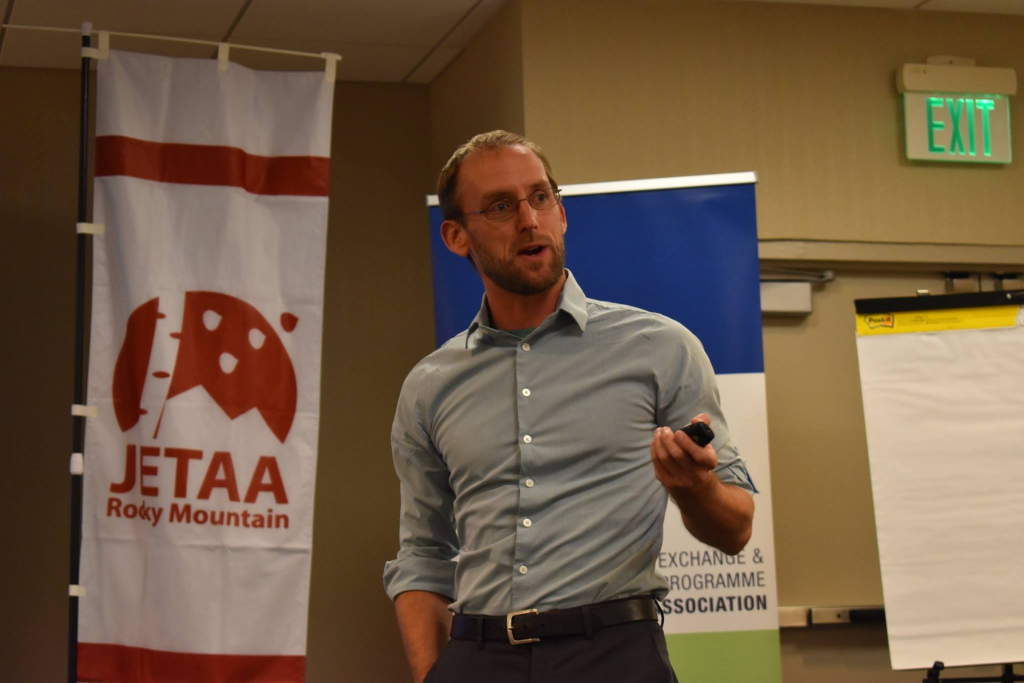
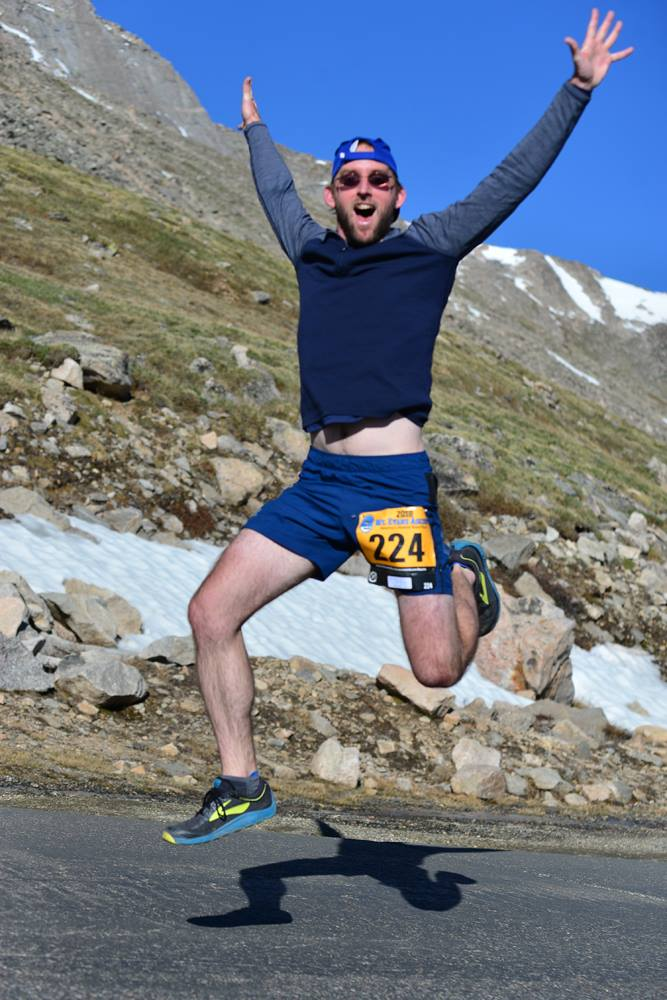
Show Links:
- JETAA Rocky Mountain
- Japanese and Japanese-American Community History Project
- Video about the Project
- Digital Archive of the CU Japanese and Japanese American Community History Project
- Paige Cottingham-Streater, Executive Director, Japan-US Friendship Commission
- JETwit
- JETAA New York
- Monica Yuki’s JET Alum Zoom Rajio Taisou every Friday, 11:30am (EST)
About the JETAA-sphere Co-Hosts:
- Steven Horowitz is the founder of JETwit.com, a member of the JETAA USA Board of Advisors, and a long-time active member of JETAA New York and now JETAA DC.
- Joe Moore is a member of the Board of Directors for both JETAA Southern California and JETAA New York and a former Co-President of JETAA Southern California.
- Zach Piper is a member of the Board of Directors for JETAA New York and a long-time active member of JETAA New York.
- Note: All three of them have full-time jobs outside of this. This isn’t how they make a living or put food on the table.
Credits
- Intro/Ending narration by Rose Horowitz (COJ)*
- Art/Design by Lee-Sean Huang (Oita-ken, 2003-06)
- Podcast hosting on Transistor courtesy of Percival Constantine (Kagoshima-ken, 2008-13)
Comments? Questions? Suggestions?
- Email Steven Horowitz at jetwit@jetwit.com
*********
- The JETAA-sphere Podcast is a production of JETwit.com, with special thanks to USJETAA and CLAIR for their support.
- *COJ = Child of JET
US-Japan community:”Calling on Japan to open to foreign students and scholars”

In advance of Prime Minister Fumio Kishida’s Friday virtual meeting with President Joe Biden, the US-Japan community has issued a letter to the government of Japan urging it to relax its border restrictions in order to allow foreign students and scholars as well as family members abroad to enter Japan.
- Link to just the letter on Nichibeiconnect.com (“US-Japan Community Urges Government of Japan to Relax Border Closure”)
- Link to the letter and additional commentary on GoPetition.com (“Calling on Japan to open to foreign students and scholars”)
“Members of the US-Japan Network for the Future initiated this petition to call on the Japanese government to expand the range of foreign visitors allowed to enter Japan subject to vaccine, testing, and quarantine requirements. The petition will be delivered to representatives of the Japanese government in Washington, DC, and in Tokyo. We encourage Japan scholars, experts, and others involved in student exchange, regardless of nationality, to sign the petition.”
https://www.gopetition.com/petitions/calling-on-japan-to-open-to-foreign-students-and-scholars.html
Over 100 scholars, educators, policy practitioners, and bridge builders of the US-Japan community have signed the letter, a number of whom are JET alumni:

- Paige Cottingham Streater, Executive Director, Japan-U.S. Friendship Commission (Also co-founder and Board Chair of US JETAA, and one of the original founders of the JET Alumni Association back in 1988!)
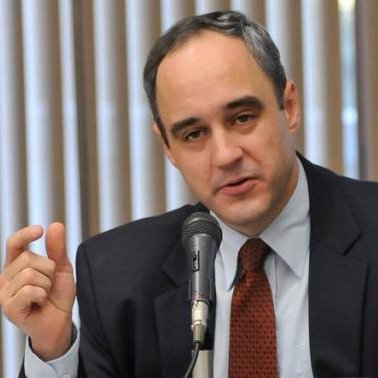
- James Gannon, Senior Fellow, Japan Center for International Exchange (JCIE/USA) (Also Vice-Director of US JETAA and a member of the JETAA USA Board of Advisors)

- Michael Green, Director of Asian Studies and Chair in Modern and Contemporary Japanese Politics and Foreign Policy, Georgetown University; Senior Vice President for Asia and Japan Chair, Center for Strategic and International Studies (Michael was a Monbusho English Fellow (MEF) which was like the beta version of the JET Program.)
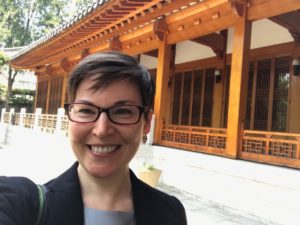
- Mary M. McCarthy, Professor of Politics and International Relations, Department of Political Science, Drake University
- Anand Rao, Assistant Professor of Political Science & International Relations, State University of New York at Geneseo
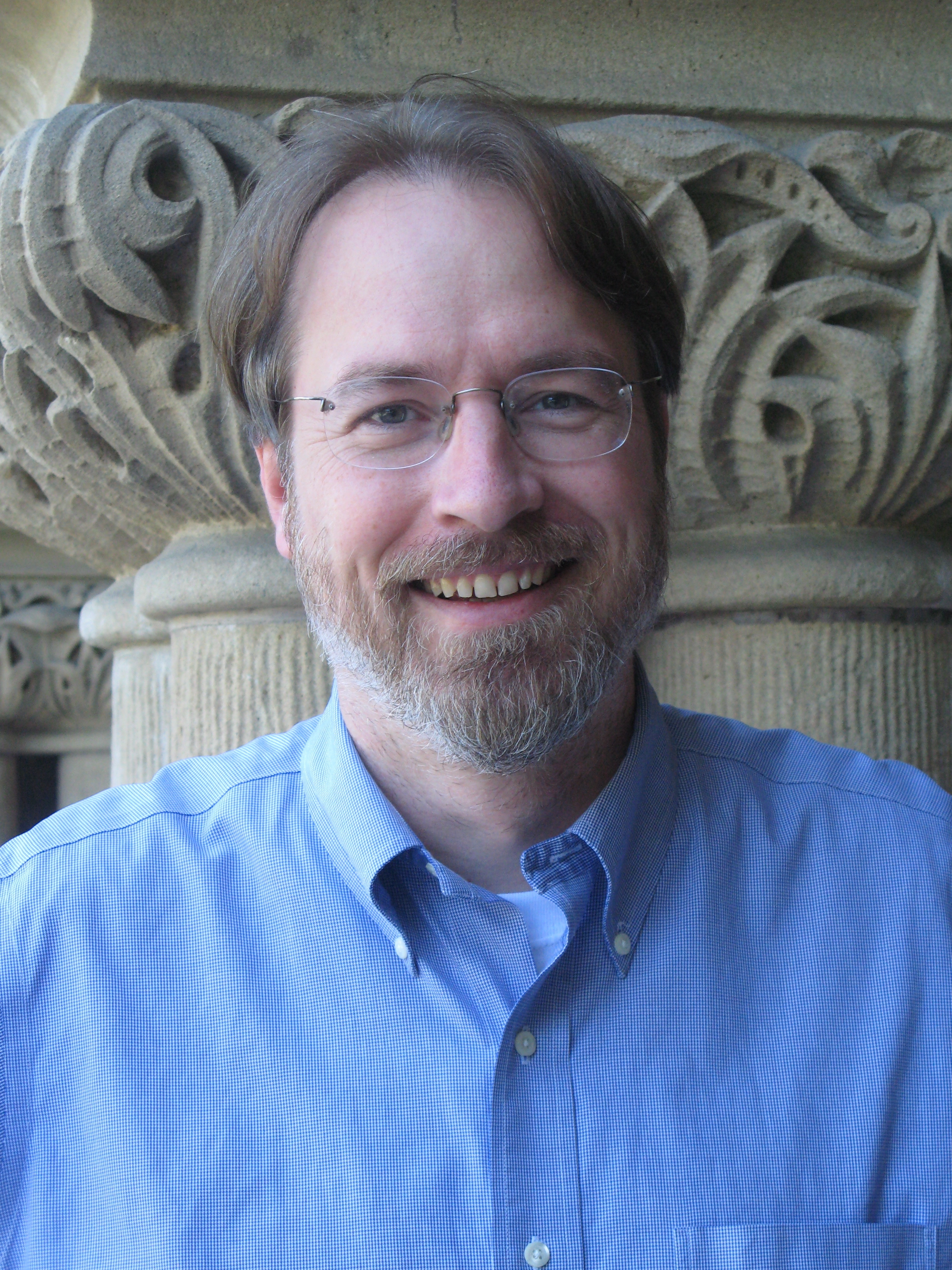
- Benjamin Self, Vice President, The Maureen and Mike Mansfield Foundation
- Note: There may be other JET alumni among the signatories. If you identify one, you can email jetwit@jetwit.com.
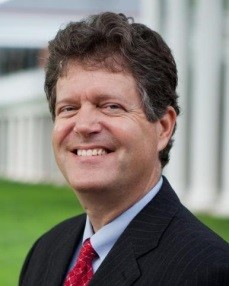
- Leonard Schoppa, Professor, Department of Politics, University of Virginia; Senior Advisor, US-Japan Network for the Future
- Ryan Shaffer, President of Japan-America Society of Washington DC
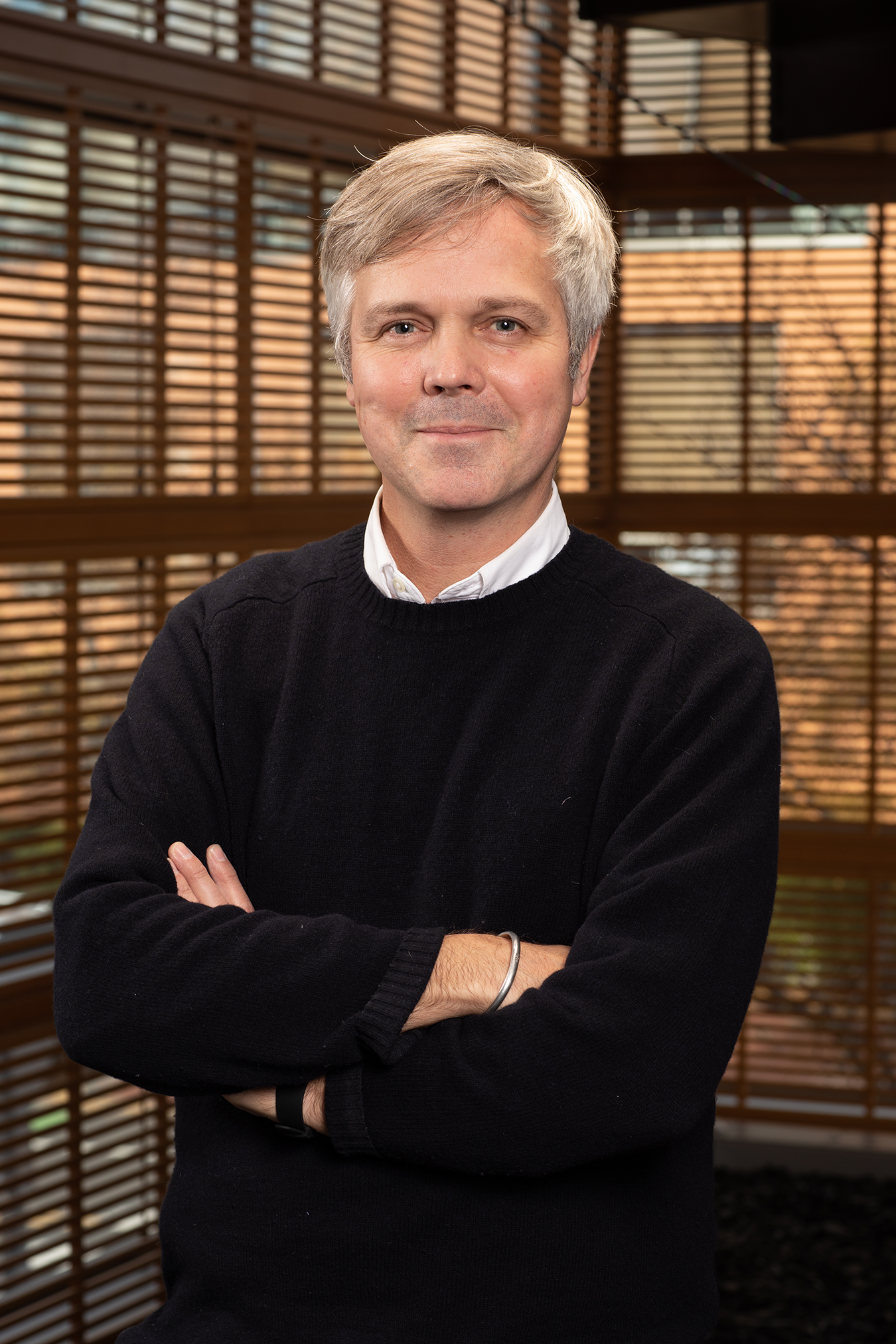
- Gavin Whitelaw, Executive Director of the Edwin O. Reischauer Institute of Japanese Studies, Harvard University

- Bahia Simons-Lane, Director, US JETAA and former President of JETAA Florida
Posted by: Doug Tassin (Fukushima-Ken ALT, 2007-2010 & Krewe of Japan Podcast Co-Host)
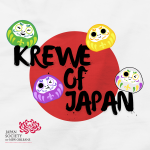
This week on the Krewe of Japan Podcast…
Jennifer & Doug unsheathe their verbal katana as they talk about Netflix’s hit documentary Age of Samurai: Battle for Japan. Notably, the documentary introduced a cast of overlooked historical figures who played a prominent role in the Sengoku Period, the Lady Samurai. Tomoko Kitagawa, a narrator featured in Age of Samurai & Japanese historian, joins the Krewe to highlight the impact of these influential women, as well as share some stories of her journey from study abroad student to world-renown historian and best-selling author. This is an interview you won’t want to miss!
The Krewe of Japan Podcast is a weekly episodic podcast sponsored by the Japan Society of New Orleans. Check them out every Friday afternoon around noon CST on Apple, Google, Spotify, Amazon, and Stitcher. Want to share your experiences with the Krewe? Or perhaps you have ideas for episodes, feedback, comments, or questions? Let the Krewe know by e-mail at kreweofjapanpodcast@gmail.com or on social media (Twitter: @kreweofjapan, Instagram: @kreweofjapanpodcast, Facebook: Krewe of Japan Podcast Page, & the Krewe of Japan Youtube Channel). Until next time, enjoy!
Posted by: Doug Tassin (Fukushima-Ken ALT, 2007-2010 & Krewe of Japan Podcast Co-Host)

This week on the Krewe of Japan Podcast…
Nigel, Doug & special JSNO guest host (and professor of English at Tulane University) Matthew Smith explore the life & legacy of esteemed journalist/author/folklorist Lafcadio Hearn, also known as Koizumi Yakumo. Hearn’s interest in the occult took him all over the world, including the cities of New Orleans & Matsue. In fact, his books on Japanese culture, folklore & ghost stories played a pivotal role in introducing Japan to the Western world during the late 19th century. Joined by Hearn’s great-grandson Bon Koizumi & his wife Shoko, the Krewe takes an in-depth look into all things Lafcadio Hearn and his impact on the world then and now.
The Krewe of Japan Podcast is a weekly episodic podcast sponsored by the Japan Society of New Orleans. Check them out every Friday afternoon around noon CST on Apple, Google, Spotify, Amazon, and Stitcher. Want to share your experiences with the Krewe? Or perhaps you have ideas for episodes, feedback, comments, or questions? Let the Krewe know by e-mail at kreweofjapanpodcast@gmail.com or on social media (Twitter: @kreweofjapan, Instagram: @kreweofjapanpodcast, & the Krewe of Japan Youtube Channel). Until next time, enjoy!
Opportunity: 2019 Rotary Peace Fellowship
Posted by Sydney Sparrow. Click here to join the JETwit Jobs Google Group and receive job listings even sooner by email.
Opportunity: 2019 Rotary Peace Fellowship
Posted by: Rotary Foundation
Location: Tokyo, Japan (among other locations)
Here’s an opportunity for a fully-funded fellowship at International Christian University in Tokyo, Japan (among other locations):
The Rotary Foundation is now accepting applications for the fully-funded Rotary Peace Fellowship. The fellowship provides academic and practical training to prepare scholars for leadership roles in solving today’s global challenges.
Up to 100 fellows are selected globally every year to earn either a master’s degree or a professional development certificate in peace and conflict studies at one of six Rotary Peace Centers at leading universities in Japan, Australia, England, the United States, Sweden and Thailand.
To learn more about the program, applicants are encouraged to visit the Rotary Peace Centers website. All applications are due 31 May 2018.
If you have any questions about the fellowship, please contact Sarah Cunningham at 1.847.425.5682 or Sarah.Cunningham@rotary.org.
JET alum research project seeks JETs and alums with diabetes
A unique request from a JET alum Melissa Smith specifically to US-based JET alumni. Please contact her if you might be able to help:
St. John’s Legal English: Comprehensible input for legal English students
Steven Horowitz (Aichi-ken, 1992-94) is Director of Legal English at St. John’s University School of Law in Queens, NY and publisher of the St. John’s Legal English blog. He will be attending the upcoming TESOL International Conference in Seattle and will be on a panel titled “Legal Language: Strategies for Effective Communication in Law School” scheduled for March 23.
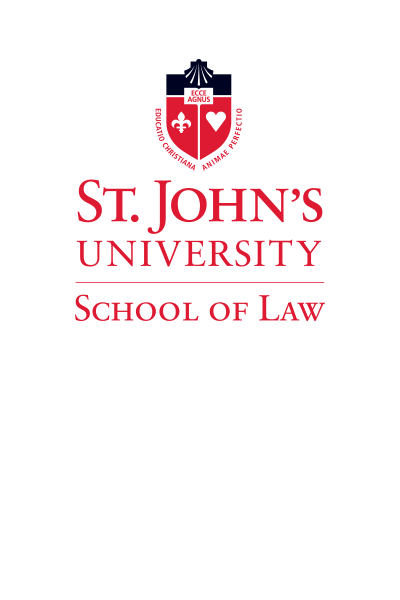 Comprehensible input for legal English students: Resources, approaches & ideas
Comprehensible input for legal English students: Resources, approaches & ideas
International students in LLM and legal English programs at US law schools come to study law, not ESL. At the same time, law study requires deep engagement with texts and concepts that are complex and challenging even for native English speakers. But how do you have substantive class discussions or evaluate students’ legal writing when students are struggling to sufficiently comprehend the language of the reading?
In linguistics, the relevant term is “comprehensible input.”
Click here to read the full blog post on the St. John’s Legal English blog.
By Mark Flanigan, Nagasaki (2000-04)
As a JET alumnus, I look back fondly on the four years I spent living and teaching in Nagasaki Prefecture. Serving on JET was, quite literally, one of those “life-changing” experiences, as it confirmed my career path in the direction of public service and global education. In the 15 years or so since my time in Nagasaki, I have been lucky to have had international roles in the U.S. government, in higher education, and at a private, Japan-focused non-profit foundation. I was even fortunate enough to return to Japan a second time, to earn my MA in Peace Studies in 2012 through the Rotary Peace Center at International Christian University (ICU) in Tokyo. Later, I served in a variety of roles in Manhattan with JETAANY between 2012-16.
My most recent career stage brought me back into the classroom, albeit in a different role and a new part of Asia for me. I am currently serving as a WorldTeach Fellow volunteer in Chittagong, Bangladesh, at the Asian University for Women (AUW). It has been both a challenging and rewarding transition back into teaching, as I felt a bit rusty in the beginning and took a bit of time to get back in the groove. Also, my main experiences with Asia had been almost entirely focused on Japan, China, and Korea. For me, South Asian history and culture was something I knew very little about up until a couple of years ago. Being here, I realized how comparatively little I knew about the diverse cultures of the Indian subcontinent of Asia. Nonetheless, it has proven to be an extremely rewarding transition, personally as well as professionally.
Me with some of my Pathways students in Bangladesh
Through a friend in New York City, I had first learned about AUW back in 2015. She had been a WorldTeach Fellow here a few years before, volunteering and having a really significant educational and cultural experience. The more I heard about her time in Bangladesh, the more I thought it sounded like a great opportunity to get back in the classroom while making a positive contribution to education for women at a significant institution like AUW. While I definitely enjoyed my four years in Manhattan, working as a Program Director with the Japan ICU Foundation (日本国際基督教大学財団), I also felt ready to take on a new challenge. I applied and was happily accepted as a new volunteer with WorldTeach, and assigned to AUW for the 2016-17 academic year.
AUW was founded in 2008 as a regional hub to help educate underprivileged women throughout different regions of Asia and the Middle East. With a liberal arts curriculum that promotes critical thinking and women’s empowerment, it is a truly encouraging place for young women who have faced numerous challenges in life due to poverty, gender bias, and sectarian conflict. With 600 students (and over 400 alumnae) from 15 different countries, including Nepal, Bhutan, Myanmar, Vietnam, Cambodia, Sri Lanka, Afghanistan, Pakistan, Syria, Palestine, and others, AUW is an amazingly diverse place. The dynamic environment, small class sizes, and daily interaction of people with many different ideas, perspectives, and cultures makes it an esteemed center of higher education in South Asia.
However, I almost missed my chance to be here. Less than one month before I was due to arrive at AUW, we heard the news of the terrible attack in Dhaka, the capital city of Bangladesh. All I knew was that international residents of the city (and their local friends and colleagues) had been targeted specifically in a vicious terror strike. The attackers, while a definite minority in terms of the general population, were sending a very clear and deadly message. Although the attack did not take place in Chittagong, it was great cause for concern among both WorldTeach and AUW staff, as well as present and future volunteers. At that time, it was not clear whether we would still be able to serve in Bangladesh, or how the program might proceed. Many safety protocols would need to be analyzed and revised before a final decision could be made. In the end we were still given the option to come, which I was definitely happy to hear.
I have now been here for seven months, teaching two different groups of students over the autumn and now spring terms. My classes are part of the Pathways for Promise Program at AUW, which is the recently developed entry point for women who have not had as much formal preparation to succeed in higher education. Many of them have come as former workers from the garment factories of Bangladesh, while others are daughters of Grameen Bank loan recipients, refugees from the persecuted Rohingya community, as well as indigenous minorities from the Chittagong Hill tracts region. In addition to Bangladeshis, Pathways students have come from Afghanistan, Cambodia, and Myanmar. They will take classes for approximately one year in Reading and Writing as well as Listening and Speaking, and also study Math and IT while participating in Community Time and Social Mentoring workshops and events.

A lovely display of Bengali cuisine
If they complete the Pathways Program successfully and meet all the exam requirements, they will advance to the one-year Access Academy and then an additional three years of undergraduate study at AUW. In all, the successful ones will graduate in five years with their bachelor’s degree in hand. Against all odds, this is their big chance to earn their college degree. Without the encouragement and funding support to match their own amazing dedication, it would most likely be impossible. It will not be easy for them. Many are far away from home and spend almost all of their time on the small but secure campus. They live in dormitories with 2-5 students per room, eat in the dining hall, and take all their classes together, so there is very little time for privacy or quiet reflection. Nonetheless, they are very eager to learn and make the most of this unique opportunity they have been granted.
It goes without saying that my students inspire me each and every day. Teaching them is really one of the biggest joys of my life here, and in many ways takes me back to my first experience teaching overseas in Japan. Although those two times are separated by about 15 years and many more miles, there are also some interesting parallels between them. Of the many things I have discovered over my time here thus far at AUW, one of the most interesting has been the surprising number of existing connections here between Bangladesh and Japan. As a former JET who later studied at ICU and worked to promote increased U.S.-Japan ties, it’s been a really pleasant surprise to find out about and help to build on these great bilateral bonds of friendship.
The first one, I discovered quite by accident. In the early part of the autumn semester, I was walking in the hallway outside of my office when I heard the distinct counts of “ICHI, NI, SAN, SHIIII!!” emanating from the level above. Intrigued, I climbed the staircase up to the next floor and was surprised to discover the gymnasium filled with perfect rows of students. They were in straight lines, balanced in strict stances, with fists alternately chambered by their side and then thrust forward in a crisp motion I instantly recognized. My mind wandered back to our small dojo in Hirado City, Nagasaki, where I spent countless hours drilling in those very same “kihon” movements. I was curious to find out more, so I made arrangements to return and observe a longer class in session.
It was then that I met Ms. Maria Chakraboty, their instructor, a remarkable woman from Bangladesh who has achieved her 5-Dan rank in Shotokan Karate. Maria serves as a real inspiration to her students, as AUW’s Associate Director of Physical Education and Karate instructor. Maria grew up in Chittagong, the same city where AUW is based, and faced hardships of her own due to people judging her negatively by her gender. She was strongly discouraged by others in her pursuit of Karate, but through the encouragement of her instructors, she has achieved a remarkable number of accomplishments. For her students, Maria is a living, breathing example of a successful adult woman, who has faced down discrimination and has continued her own personal growth through embracing the Japanese art of Karate. She has been able to impart her wisdom and experience to hundreds of young students through the years. Such is the wonderful environment of a cross-cultural, liberal arts university like AUW.
Maria (Center) training with some of her AUW students
In addition to Karate, there are other tangible bonds of kizuna between AUW and Japan. Attending the University’s Club Fair this past autumn, I was happy to learn that AUW students are involved in all kinds of social and academic club activities. Similar to Japan, students here balance their time between formal classes and organized clubs, like Model UN, Animal Welfare, a variety of sports, and other pursuits. Most interestingly to me, I discovered that there is a very active group of students on campus who are involved in the AUW Japan Circle Club! They are extremely genki and know an amazing amount of things regarding Japanese culture. They study Japanese on their own (as it is not taught here), read manga, watch anime, and even make their own kimono and other clothing by hand! Upon meeting them, I shared my experience as a JET alumnus and former ICU graduate student. They asked me to serve as their faculty advisor, to which I most happily agreed!
With some of the AUW Japan Circle Club students (and their hand-made clothing)!
I have been very happy to be working with them on various projects here this term. Most specifically, we have planned and organized a Japanese book drive among some of my colleagues and friends in Japan and Hong Kong. Through their kind and generous help, we have now received about seven boxes full of manga, books, magazines, language textbooks, and Japanese-English dictionaries from abroad! All of these were donated to the AUW library, so students can access them freely anytime. As none of our students have been able to visit Japan as of yet, they really love the chance to see any kind of “hon mono” firsthand. One Tokyo friend in particular also sent a variety of delicious Japanese candies, which were a big hit with the students! We are still interested in receiving any other items from Japan, if anyone would like to donate. Additionally, the students performed a number of Japanese songs (in Japanese) and dances for our recent Lunar New Year Festival. We hope to develop exchange partnerships with AUW and universities in Japan, in order to offer study abroad opportunities in both directions. Interestingly, at least one AUW alumna is now studying in Japan, earning her Master’s degree at the United Nations University (UNU) in Tokyo!
Lastly, there is a very robust level of support for AUW in Tokyo. As part of the global support network for AUW students, a number of highly-accomplished and very influential donors make up the “Friends of AUW Japan” organization. Among them is Ms. Kathy Matsui,Vice Chair of Goldman Sachs Japan,who has a long and deep connection to AUW. In 2007, she was chosen by the Wall Street Journal newspaper as one of the “10 Women to Watch in Asia” for her work on the “Womenomics” theme, and serves as a board member of the AUW Support Foundation. Ms. Matsui and her husband, Mr. Jesper Koll, have been major donors to AUW since its inception, and they continue to look for ways to promote exchange between AUW and Japanese universities and companies. In addition, First Lady Akie Abe serves as an official Patron of AUW and has been actively involved with a number of fundraising efforts on behalf of the university in Tokyo over the past few years. Lastly, AUW has enjoyed very generous support through the past several years from a number of Japanese companies like HITACHI, MITSUI & CO., TOSHIBA CORPORATION, and UNIQLO.
First Lady Akie Abe (center) and Ms. Kathy Matsui (second from right)
In conclusion, I would say my time here in Bangladesh has been a wonderful journey thus far. In many ways, it’s a completely new (and sometimes bumpy) experience for me, living in South Asia and in a developing, Muslim-majority country for the first time. Culturally, it’s much different than what I was used to, but that’s been a good opportunity to broaden my own horizons and question my preconceived notions about life as well. My students in the Pathways for Promise Program specifically, and AUW students in general, have taught me so much and really inspired me through their own energy, resilience, and desire to learn. As a nice coincidence, this latest chapter in my career also brings me back to teaching and to Japan in many ways. I am happy to have so many “natsukashii” moments here, to help teach these remarkable young women, and also to be in a position to try and advance the relationships between people in Bangladesh and Japan. In some ways, it’s the most unexpected yet personally satisfying addition to my time here at AUW. I’m happy to make the most of all these fortuitous connections during my time here in Bangladesh and beyond.
=================================================================================
Mark Flanigan is currently a WorldTeach Fellow volunteer in Chittagong, Bangladesh, at the Asian University for Women (AUW). Mark served as an ALT in Nagasaki Prefecture from 2000-4, and later studied for his MA in Peace Studies as a Rotary Peace Fellow at the International Christian University (ICU) in Tokyo from 2010-12. After graduating from ICU in 2012, he spent four years working for the Japan ICU Foundation in NYC. He has also held leadership roles in the JET Alumni Associations of both New York and Washington, DC. He can be reached at markinmitaka(at)gmail.com

Survey: JET alum research survey on microaggressions experienced in Japan
********************
Hello fellow JET alums! My name is Stephanie Hupp, and I was an ALT in Akita Prefecture from 2011-2015. I worked in a wonderful little town called Yurihonjo. I don’t miss the brutal winters but I do miss living and working in Japan!
However, I have decided to come back to school to get my masters in Communication, specifically in Intercultural Communication. Based on my many years in Japan, I am writing about life for American ALTs in Japan and some of the potentially negative experiences they might have faced (or maybe they experienced none!). I am specifically looking at microaggressions and how they might relate to job satisfaction and satisfaction with co-workers. A microaggression is defied as “brief and commonplace daily verbal, behavioral, or environmental indignities, whether intentional or unintentional, that communicate hostile, derogatory, or negative racial slights and insults toward people of color.” While this definition regards people of color, I am investigating to see if these same experiences happen with Americans as more and more Americans work abroad. A common one many of you might have heard is the compliment “You are good at using chopsticks!” or maybe a restaurant or bar was seemingly nervous because of a potential language barrier.
Unfortunately, my study is only open to American JETs (sorry my UK/Aussie/Kiwi JETs!). I have compiled a short survey (it should take about 20 minutes to complete) as well as a section at the end where you can put an e-mail if you wish to be contacted for an interview. Any help I can get is greatly appreciated, and if you know someone that would like to participate please pass them this message! The link is mobile friendly. You can take the survey here. I hope the results of this survey will help JETs have a better understanding of their experiences, as well as potentially help future JETs fully prepare for life and work abroad.
http://uark.qualtrics.com/SE/?SID=SV_57PuZEMiukOKlal
All the best in your endeavors!
Stephanie Hupp
University of Arkansas Department of Communication
Public Speaking Instructor and TA
Good Doc, Bad Doc
Nathaniel Simmons (Nara-ken, 2007-2009) is currently a communication professor at Western Governors University and lives in Columbus, OH, USA. He teaches a variety of intercultural, interpersonal, and health communication courses. He has researched and published several scholarly articles regarding privacy management between foreign English teachers and Japanese co-workers in Japan and is currently working on turning his research into a book.
What makes a good or bad medical professional?
From school medical checks to hospital visits, the average ALT has several medical encounters throughout their year(s) in Japan. Intrigued by my own experiences within the Japanese medical world, I interviewed 49 foreign English teachers in Japan about their healthcare experiences, and here’s what they said (in a much more condensed format):
Bad providers violate patients’ cultural expectations
ALTs perceived providers that “violated,” and/or did not perform culturally expected practices as “bad” providers. In other words, if a Japanese medical profession didn’t act as expected, the ALT perceived the experience and the medical provider as negative, or “bad.” As an example, one English teacher characterized the difference between a “good” and “bad” doctor. The following is an excerpt that distinguished between two physicians this English teacher encountered while seeking treatment for bronchitis.
“I walk into his [the doctor’s] office and he’s like, ‘Yeah, you’re not healthy I can hear you from outside. This isn’t just a cold is it?’ ‘No.’ Just from hearing me cough he knew that I wasn’t well. He says to me, ‘You either have bronchitis or pneumonia. We’re going to take an x-ray and blood tests to find out.’ Difference in doctor right there! One of them [the bad one] just hands out a diagnosis and is like I think you might need antibiotics and the other [the good one] is like I want to do a blood test and do an x-ray to make sure you need the antibiotics and if they’re the right kind. So that doctor, the good doctor, figures out all the information I needed. The bad doctor, is like, ‘I’m going to give you medicine now. Goodbye. Give me ¥600.’”
This ALT’s experience with an array of Japanese medical professionals within Japan allowed the ALT to construct a comparison and contrast of “good” and “bad” doctors. According to this ALT, good doctors either knew quickly what was wrong with a patient or took immediate action to determine what was causing the patient illness or discomfort as well as how to alleviate it. The “good” doctor sought to understand the patient’s perspective and the illness versus simply handing out an antibiotic which may not treat the illness for a fee.
Throughout interviews with ALTs, “bad” providers were described as:
- Ignited fear within the patient(s) by thinking out-loud and muttering possible diagnoses.
- Provided no verbal or nonverbal cues, especially on invasive exams like pap smears.
- Did not provide an “appropriate/adequate” diagnosis.
Good providers attend to the patients’ cultural expectations
ALTs believed that “good” providers should attend to their cultural expectations (i.e., all of those standards and norms for practice in one’s home culture). In other words, “good doctors” should behave and act like one might expect in their home country. For instance, when discussing a positive time with a doctor, one English teacher said:
“People here don’t always smile when they meet you and things like that. As a westerner you think, ‘Oh you don’t like me,’ but no it’s just because Japanese don’t smile. When he [the doctor] first met me, he smiled at me, he introduced himself [in English], and so far it’s all been working out.”
Overall, “good” providers were described in interviews as:
- “Very nice and understanding.”
- “Similar to what I’d experience back home.”
- Had “appropriate” body language.
- Exceeded expectations on providing medical education, understanding, and comprehension to patients.
What next?
This study raises the importance of intercultural health communication training. More programs need it. English teachers are placed throughout Japan by numerous organizations and boards of education and are expected to live well. However, that “living well” can be complicated when foreigners expect intercultural interactions to progress flawlessly and as according to their own culture. Some ALTs even chose to not re-contract due to their health care experiences in Japan (and not necessarily because they are in poor health). Scholars argue about “who should adapt to whom,” but that doesn’t really help us in the day-to-day life of a foreigner navigating a medical system (in Japan).
Here are some suggestions, what others do you have?
- Expect difference.
- Do your homework.
- Research the Japanese medical system.
- What similarities, if any, exist between Japan and your home country?
- What differences, if any, exist between Japan and your home country?
- Google Japanese words for common symptoms and your current prescriptions.
- Ask questions to a friend, other English teachers, and co-workers (if you feel comfortable).
- What should I expect when I go to the doctor/dentist/hospital?
- What surprised you about the Japanese medical world? (to other foreigners).
- What over the counter medicine do you find works best for _____?
- Research the Japanese medical system.
- Laughter helps.
- Remember that Japanese medical professionals are trained professionals.
- Insert your tips here ______________!
This blog post is an adaptation of the scholarly article:
Simmons, N. (2016). (De-)legitimizing medical professional discourses: Evaluations from foreign English teachers in Japan. Language & Intercultural Communication, 16(2), 1-18. doi:10.1080/14708477.2015.1113984
Available at: http://www.tandfonline.com/doi/abs/10.1080/14708477.2015.1113984?journalCode=rmli20
JQ Magazine: 3/11 — Where We Stand Five Years Later
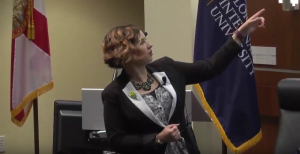
Bahia discusses the earthquake that struck Japan on March 11, 2011 at Florida International University, March 8, 2016. (Courtesy of Bahia Simons-Lane)
By Bahia Simons-Lane (Gunma-ken, 2005-07) for JQ magazine. Bahia taught at an all-girls’ high school on JET, and following her time on the program she held the position of ALT Advisor for the Gunma Board of Education from 2007-08. Bahia earned her master’s degree in International and Intercultural Education and certificate in Asian Studies from Florida International University in 2014, and is currently pursuing her Ph.D. in Curriculum and Instruction, Language, Literacy, and Culture. She is president of the Florida chapter of the JET Alumni Association.
On March 11, 2011, I woke up like it was any other day, but minutes after I walked downstairs I realized it wasn’t. Two of my friends were staying with me at the time. When we came downstairs the first thing they said to us was, “Did you hear about what happened in Japan?” We spent the rest of the day glued to the Internet and TV, horrified and shaken by the devastation caused by the earthquake and tsunami. That was five years ago.
This March 11 marked the five-year anniversary of the triple disaster that devastated the Tohoku region of Japan. The earthquake and subsequent tsunami killed thousands of people with many more displaced from their homes. Yet, like with many disasters over time, people stop thinking about what happened and it fades into the background. With the five-year anniversary approaching, I realized that I hadn’t heard a lot about how the Tohoku recovery was progressing. I knew that those without strong ties to Japan had probably forgotten all about the disaster entirely. It was time to look into how the recovery had progressed and share it with students at Florida International University who may not know much about the disaster, so I pitched the idea to the organizer of the Tuesdays Times Roundtables (TTRs) and it was agreed that it would be a great addition to the spring lineup.
FIU’s Office of Global Learning presents TTRs every week in conjunction with the New York Times. I proposed the talk for the March 8 roundtable, which seemed like perfect timing to discuss the 3/11 earthquake. The TTRs are a series of talks that focus on news items published in the New York Times and offers a closer look at some of the articles and the issues they address. The TTRs are usually well attended, and my talk was no exception, with approximately 40 people in attendance. Mostly students, they were avid listeners who asked interesting questions and made insightful comments (view the video of the complete presentation for more).

